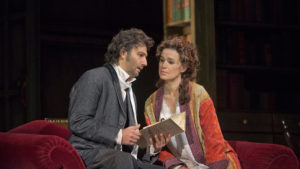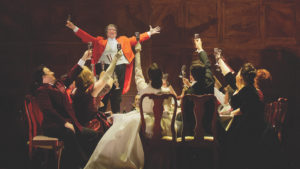The Metropolitan Opera in New York continues to offer free streams (beginning each night at 7:30 p.m. and running for 24 hours) of great productions and performances. This is Puccini Week: Madama Butterfly is Thursday, September 24th; Tosca is Friday, September 25th; Turandot is Saturday, September 26th; and La Bohème is Sunday, September 27th. Search for “Nightly Met Opera Streams,” or, with a Met Opera onDemand subscription, watch anytime.
The Metropolitan Opera
Get the Met
The Metropolitan Opera in New York continues to offer free streams (beginning each night at 7:30 p.m. and running for 24 hours) of great productions and performances. This is Puccini Week: Madama Butterfly is Thursday, September 24th; Tosca is Friday, September 25th; Turandot is Saturday, September 26th; and La Bohème is Sunday, September 27th. Search for “Nightly Met Opera Streams,” or, with a Met Opera onDemand subscription, watch anytime.
Get the Met
The Metropolitan Opera in New York continues to offer free streams (beginning each night at 7:30 p.m. for 24 hours) of great productions and performances. This is Puccini Week: Madama Butterfly is Thursday, September 24th; Tosca is Friday, September 25th; Turandot is Saturday, September 26th; and La Bohème is Sunday, September 27th. Search for “Nightly Met Opera Streams,” or, with a Met Opera on Demand subscription, watch anytime.
OPERA
Goethe’s Tortured Hero, Set to Massenet’s Music
Werther was originally rejected by the Paris Opera as too ‘gloomy’

Jules Massenet’s music has never moved me. It’s too thickly orchestrated, and his choice of dramas too extreme. Werther, easily Massenet’s best opera, filled with romantic melodies and dissonant outbursts, bears the melodramatic hallmarks of late 19th-century French music.
The Metropolitan Opera will be streaming Werther, for free, this Sunday, Sept. 13, starting at 7:30. In spite of its flaws, it’s worth tuning in.
The cast is stellar. Jonas Kaufmann in the leading role has everything a tortured romantic hero should: a beautiful tenor voice with gravitas and lightness, good looks, and superb acting ability. Sophie Koch, making her Met debut as Charlotte, is wonderful. Her voice flows like velvet, and she is primly believable in her determination to keep her promise to marry the boring but stable Albert. In this production, from March 2014, Lisette Oropesa as Charlotte’s younger sister is sweet and fresh, inserting needed moments of relief.
The story is a tragic love triangle: a young man in love with a married woman sees death as the only solution. He cannot commit murder, so he kills himself.
The opera is based on The Sorrows of Young Werther, written in 1774, more than 100 years before Massenet’s version. Author Johann von Goethe, age 24, was himself hopelessly in love with a married woman, and the book created an enormous sensation, inciting copycat suicides. This “Werther Fever” prompted Denmark and Italy, among other locales, to ban the book. In 1775, the city of Leipzig not only prohibited its sale but banned the wearing of Werther’s outfit: yellow pants with a blue waistcoat.
Massenet finished his opera in 1887, but the director of the Paris Opéra-Comique rejected it as too “gloomy.” Massenet put Werther aside and focused on other works. The Imperial Vienna Opera staged the premier in 1892 to great acclaim, with the composer conducting.
This Met production by Sir Richard Eyre, with its video projections, is fascinatingly literal. Eyre sets the opera in the late 19th century and fills in the gaps in the story by using high tech and realistic special effects. The foreboding music in the overture is accompanied by a flashback to the death and funeral of Charlotte’s mother — artistic license, as this does not appear in the original staging directions. Throughout, Eyre’s visual concept brings the action as close to the audience as possible through a series of skewed framing devices, which are both innovative and metaphorical, as Werther’s emotional stability teeters as well.
The projections change the mood. In Act I, the children are eating cake by their house, and Charlotte is on her way to the ball. With no set change, just the addition of some candles, a change in the projections puts the action at the glamorous ball. Then, just as suddenly, Charlotte and Werther are walking home under the trees.
Prepare yourself for a CSI-worthy blood spatter at the end of the opera. Eyre has Werther shoot himself through the heart (naturally), rather than in the head as the original directions specify. In true operatic form, Werther continues to sing for a good 20 minutes.
The music is through-composed: episodes are linked as in a picture book. Often, when Massenet repeats a melody in the orchestra, the singer sings another line on top of that music, allowing for thematic variation.
Finally, Massenet’s orchestra makes the unusual inclusion of the saxophone. The saxophone is not often used in Western classical opera, as it was not invented until 1846. It appears in Act III, in Charlotte’s aria “Va! Laisse couler mes larmes” (“Go, let my tears flow”), and serves to underscore its mournful meaning.
I prefer Italian opera, with succinct stories about ordinary people and circumstances. The Parisian audiences of the time demanded complicated dramas with thick scores and extreme stories, and Massenet obliged. In Werther, there are beautiful melodies, great theater, and, in this production, the singing is fantastic.
N.B.: Be sure to watch the interviews at the end. You’ll see Jonas Kaufmann out of character, smiling and laughing — such a relief!
The synopsis here: metopera.org/discover/synopses/werther/ and a link to my opera talk here, starting Friday: youtube.com/channel/UChS8HFPW-43dy7-y2zW1XBA.
Désirée Elsevier has been a violist in the Metropolitan Opera Orchestra since 1987.
OPERA
Met’s Falstaff Is a Feast for Eyes and Ears
Verdi’s complex score is perhaps his greatest

Giuseppe Verdi was 77 when he began work on Falstaff, his last and arguably his greatest musical achievement, and his only successful comedy. More than 50 years earlier, he had lost his young wife and their two infants. Verdi’s only other comedy, Un Giorno di Regno, was written in the aftermath of that tragedy, and it failed miserably.
Falstaff premiered at La Scala in Milan in 1893. Onstage after the opening night performance with the cast, the librettist, and the conductor, the composer, now nearly 80, enjoyed the audience’s ovation, which lasted more than an hour.
The Metropolitan Opera will be streaming, for free, a classic performance of Falstaff from December 2013 this Sunday, Aug. 30, starting at 7:30 p.m. Here’s why you should tune in.
First, it’s a good story. Verdi loved Shakespeare. Loosely based on Shakespeare’s Merry Wives of Windsor, this comedy centers on someone we all know: the vain, aging, unscrupulous neighbor who always expects a free ride and feels entitled to indulge his every whim. Verdi’s librettist, Arrigo Boito, set Shakespeare’s prose in beautiful verse, and he bases the character of Falstaff on the figure of the same name from Shakespeare’s Henry IV.
At the end of the opera, Boito has the irresponsible and irrepressible Falstaff realize he’s been duped by the women of Windsor; he is uncharacteristically chastened and accepts his lesson good-naturedly. The opera ends with an effervescent 10-voice fugue in which all onstage sing, “Everything in the world is a jest … but he laughs well who laughs the final laugh!”
And that’s the next reason to watch Falstaff: the incredible music. You will not hear the usual playlist of arias, of individual characters singing their hearts out for applause. Instead, you will be treated to a sophisticated melange of complex musical numbers designed to subtly paint the emotions of the scenes.
In Act I, Falstaff is in bed at an inn, drinking sherry, and a disgruntled Dr. Caius storms in, accusing Falstaff of ripping him off. The notes in the orchestra exactly fit the little man with the briefcase and bad comb-over: whiny and irritating. When Falstaff’s lackeys refuse to scam the wives of Ford and Page, he lapses into musing about the nature of honor. “What is honor?” he asks. “Can you hold it, touch it, smell it? Does it have a nose? A finger?” The music is exactly as you’d imagine, getting higher in pitch, and with a low voice, Falstaff answers himself and convinces us it’s OK to occasionally ignore honor.
In the opening of Act I, Scene 2, the ladies of Windsor are lunching and chatting (the Italian word is chiacchiere), and the wind section plays high spiky notes that are passed from one instrument to another in exactly the way the women giggle and interrupt each other. They scoff at Falstaff, with a trill on the word immenso, denoting the jiggling largeness of Falstaff himself.
In the chaos at the end of Act II, when Falstaff is hiding in Alice Ford’s laundry basket and the townspeople come looking for him, the music is intricate — we see and hear this raid. These are but a few examples of how the music mirrors words and motion. And while you listen to the words, notice how the orchestra plays the virtuoso score with elegance and sparkle.
If the story and music were not enough reason to enjoy this opera, consider the way it embodies Verdi’s admiration and respect for strong, independent women. Bold, clever women, evident in Falstaff, were also clearly present in Verdi’s life. His second wife, Giuseppina Streppina, an opera singer and voice teacher, lived with him for 12 years before she agreed to marry him. Here’s what he wrote in a letter about her when they were getting pushback from their neighbors in Busseto, Italy: “I have nothing to hide. In my house, there lives a lady, free and independent, who, like myself, prefers a solitary life, and who has a fortune capable of satisfying all her needs. Neither I nor she is obliged to account to anyone for our actions. But who knows what our relations are? What affairs? What ties? What rights I have over her or she over me? … I will say this to you, however: in my house, she is entitled to as much respect as myself, more even.”
They eventually did marry, and throughout the course of their long and, by all accounts, happy life together Verdi sought her advice and assistance on all his projects. At least five of his operas (Stiffelio, Luisa Miller, Rigoletto, La Traviata, and Il Trovatore) portray strong, free-willed women who take grief from the community.
The cast of this Metropolitan Opera production is outstanding, including Ambrogio Maestri as Falstaff, who actually looks like the fading aristocrat; Stephanie Blythe as Mistress Quickly; Angela Meade as Alice Ford; and Lisette Oropesa as Nannetta. The production, by director Robert Carsen, premiered at the Royal Opera House in London. While the original play is set in the Elizabethan England of the 16th century, this production is set in post-World War II England during the reign of Elizabeth II. The costumes and the imaginative sets are brightly colored. Falstaff eats his way through the entire opera, and we join him in devouring a feast for our eyes and ears.
Even with subtitles, it goes by fast, so be sure you read the synopsis before you watch, here. For more back story, there is an opera talk on my YouTube channel, here.
Désirée Elsevier has been a violist in the Metropolitan Opera Orchestra since 1987.
